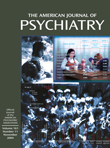Riluzole Augmentation for Treatment-Resistant Depression
Ms. A was a 42-year-old woman with a history of major depressive disorder. Despite pharmacotherapy strategies, including fluoxetine, fluoxetine augmented with lithium, and her current regimen of bupropion (100 mg b.i.d.) and venlafaxine (up to 300 mg/day), she remained depressed, with scores of 21 on the 25-item Hamilton Depression Rating Scale and 17 on the Beck Depression Inventory. After we obtained written informed consent, riluzole, 50 mg b.i.d., was added to her current medication regimen. Within 1 week, her Hamilton depression scale and Beck Depression Inventory scores decreased by 16 and 10 points, respectively. Repeated measures of her depression severity reflected scores in the remitted range, with a score of 1 on the Hamilton depression scale and 0 on the Beck Depression Inventory at the end of 6 weeks and a Hamilton depression scale score of 4 and a Beck Depression Inventory score of 4 at the end of 12 weeks of continued treatment.Ms. B was a 55-year-old woman with a 33-year history of major depressive disorder. Her pharmacotherapy history included adequate courses of various tricyclic and selective serotonin reuptake inhibitor monotherapies, nefazodone, and the combination of sertraline and bupropion. Immediately after an index course of seven bifrontal ECT treatments, her Beck Depression Inventory score was 15; however, within 2 weeks, her score rose to 32 despite continued weekly ECT treatments. For the previous 6 months, while her mood was maintained with fluoxetine (80 mg/day), methylphenidate (58 mg/day), and ongoing cognitive behavior therapy, her Beck Depression Inventory scores fluctuated between 17 and 31. After we obtained written informed consent, treatment with riluzole, 50 mg b.i.d., was started. Ms. B’s Hamilton depression scale and Beck Depression Inventory scores before riluzole were 34 and 27, respectively. Within 1 week, her Hamilton depression scale score dropped to 22, and her Beck Depression Inventory score decreased to 11. At week 6, her Hamilton depression scale and Beck Depression Inventory scores were both 7; at week 12, her scores were 9 and 5, respectively.Baseline laboratory evaluations, including liver function tests and a CBC with differential, were collected before study initiation. Additional tests were performed at 2–3-week intervals for 12 weeks and then monthly to monitor riluzole’s known risk of serum aminotransferase elevations and neutropenia. Neither patient experienced significant aminotransferase elevations (more than five times the normal upper limits) or neutropenia or endorsed any other side effect.
References
Information & Authors
Information
Published In
History
Authors
Metrics & Citations
Metrics
Citations
Export Citations
If you have the appropriate software installed, you can download article citation data to the citation manager of your choice. Simply select your manager software from the list below and click Download.
For more information or tips please see 'Downloading to a citation manager' in the Help menu.
View Options
View options
PDF/EPUB
View PDF/EPUBGet Access
Login options
Already a subscriber? Access your subscription through your login credentials or your institution for full access to this article.
Personal login Institutional Login Open Athens loginNot a subscriber?
PsychiatryOnline subscription options offer access to the DSM-5-TR® library, books, journals, CME, and patient resources. This all-in-one virtual library provides psychiatrists and mental health professionals with key resources for diagnosis, treatment, research, and professional development.
Need more help? PsychiatryOnline Customer Service may be reached by emailing [email protected] or by calling 800-368-5777 (in the U.S.) or 703-907-7322 (outside the U.S.).

